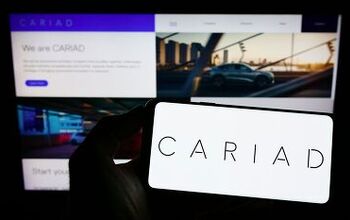China's Geely Adjusts End-of-year Outlook

China’s Geely Automobile Holdings reported a first-half net profit drop of 43 percent on Monday, a tumble that forced it to reduce end-of-year targets. As you may have expected, the coronavirus was named as the biggest obstacle it had to overcome, especially in its home country. That left Geely (parent to Volvo, Lotus, Proton, Lynk & Co, Emerald Automotive, London EV and more) revising 2020 volume estimates by 6 percent to 1.32 million vehicles against the 1.36 million deliveries it enjoyed through 2019.
While enduring a bad financial year in 2020 is hardly breaking news for any major automotive manufacturer, Geely is one of many Chinese firms with global aspirations. Its role as Daimler’s second-largest stakeholder and ownership of Volvo Cars (with which it is planning a full merger) arguably makes it the corporation that’s closest to achieving that goal, too. Yet the current economic and geopolitical situation served to undermine its ultimate goal of becoming Asia’s answer to Volkswagen Group.
According to Reuters, Geely’s recent failing was to be expected. Despite the company saying it was on point to surpass last year’s volume with 1.4 million sales before January less than a month ago, nobody who seriously watches the industry was betting on that outcome.
“Geely’s 1H20 earnings are largely in line with our expectation, thanks to its significant cost cut efforts, especially in wages and investments in fixed assets,” said Haitong International analyst Shi Ji told the outlet.
From Reuters:
Geely has a market capitalisation [sic] of about $21.2 billion, eclipsing international peers better known outside of China such as Fiat Chrysler Automobiles NV and Nissan Motor Co Ltd.
Its parent, Zhejiang Geely Holding Group Co Ltd, plans to merge the automaker with affiliate Volvo Cars and list the successor in Hong Kong and possibly Stockholm.
Merger talks were suspended in June, however, while the Hong Kong-listed automaker worked on listing shares on mainland China’s Nasdaq-like STAR board.
The Communist Party of China’s decision to impose new security laws on the people of Hong Kong has really complicated the matter. By stripping the island of much of its autonomy, China effectively removed the region’s special status as an autonomous haven of freedom and foreign commerce. U.S. President Donald Trump has already said Hong Kong will now have to be treated as the rest of China in terms of trade, with other nations likely to follow suit — most notably the United Kingdom.
While this will cause new problems for Geely as it endeavors to expand internationally, the company is still equipped to make big moves. Further integration with Volvo Cars seems assured, with the plan being to use a group platform that will eventually be shared between all Geely brands.
[Image: Jenson/Shutterstock]

A staunch consumer advocate tracking industry trends and regulation. Before joining TTAC, Matt spent a decade working for marketing and research firms based in NYC. Clients included several of the world’s largest automakers, global tire brands, and aftermarket part suppliers. Dissatisfied with the corporate world and resentful of having to wear suits everyday, he pivoted to writing about cars. Since then, that man has become an ardent supporter of the right-to-repair movement, been interviewed on the auto industry by national radio broadcasts, driven more rental cars than anyone ever should, participated in amateur rallying events, and received the requisite minimum training as sanctioned by the SCCA. Handy with a wrench, Matt grew up surrounded by Detroit auto workers and managed to get a pizza delivery job before he was legally eligible. He later found himself driving box trucks through Manhattan, guaranteeing future sympathy for actual truckers. He continues to conduct research pertaining to the automotive sector as an independent contractor and has since moved back to his native Michigan, closer to where the cars are born. A contrarian, Matt claims to prefer understeer — stating that front and all-wheel drive vehicles cater best to his driving style.
More by Matt Posky
Latest Car Reviews
Read moreLatest Product Reviews
Read moreRecent Comments
- SCE to AUX With these items under the pros:[list][*]It's quick, though it seems to take the powertrain a second to get sorted when you go from cruising to tromping on it.[/*][*]The powertrain transitions are mostly smooth, though occasionally harsh.[/*][/list]I'd much rather go electric or pure ICE I hate herky-jerky hybrid drivetrains.The list of cons is pretty damning for a new vehicle. Who is buying these things?
- Jrhurren Nissan is in a sad state of affairs. Even the Z mentioned, nice though it is, will get passed over 3 times by better vehicles in the category. And that’s pretty much the story of Nissan right now. Zero of their vehicles are competitive in the segment. The only people I know who drive them are company cars that were “take it or leave it”.
- Jrhurren I rented a RAV for a 12 day vacation with lots of driving. I walked away from the experience pretty unimpressed. Count me in with Team Honda. Never had a bad one yet
- ToolGuy I don't deserve a vehicle like this.
- SCE to AUX I see a new Murano to replace the low-volume Murano, and a new trim level for the Rogue. Yawn.


































Comments
Join the conversation
Why the "[sic]" in the first line of the Reuters text? Geely's head of PR is English, so it makes sense that they will use English, rather than American spellings, hence the spelling of "capitalisation" with the English "s" rather than the equally-correct American "z".